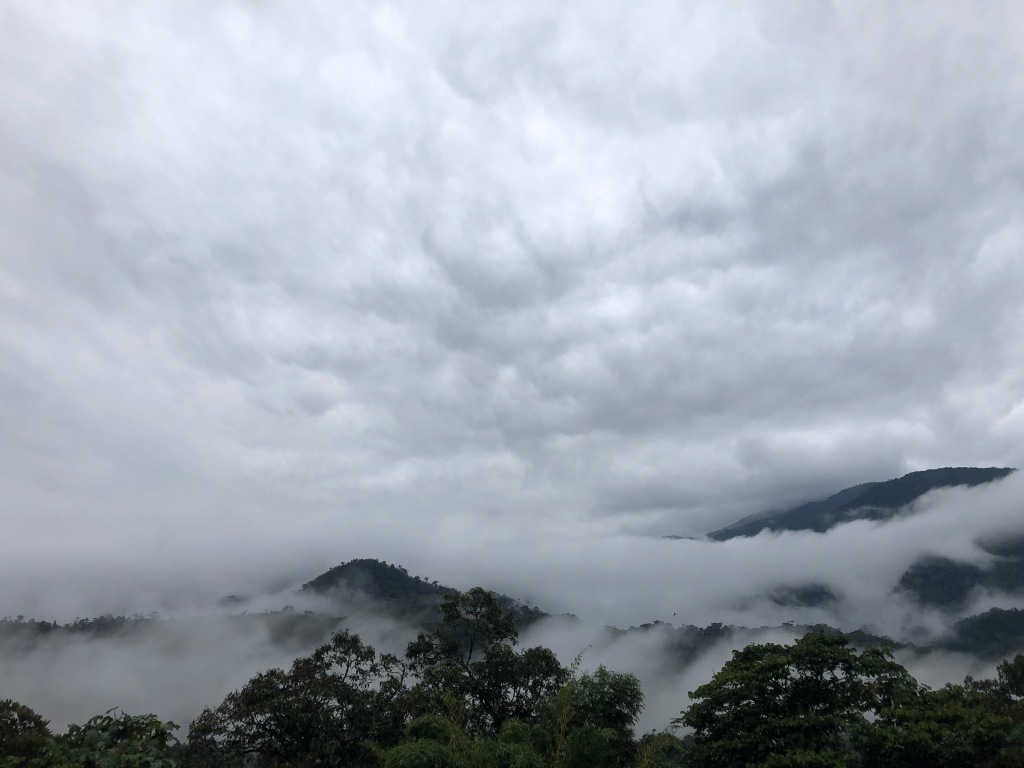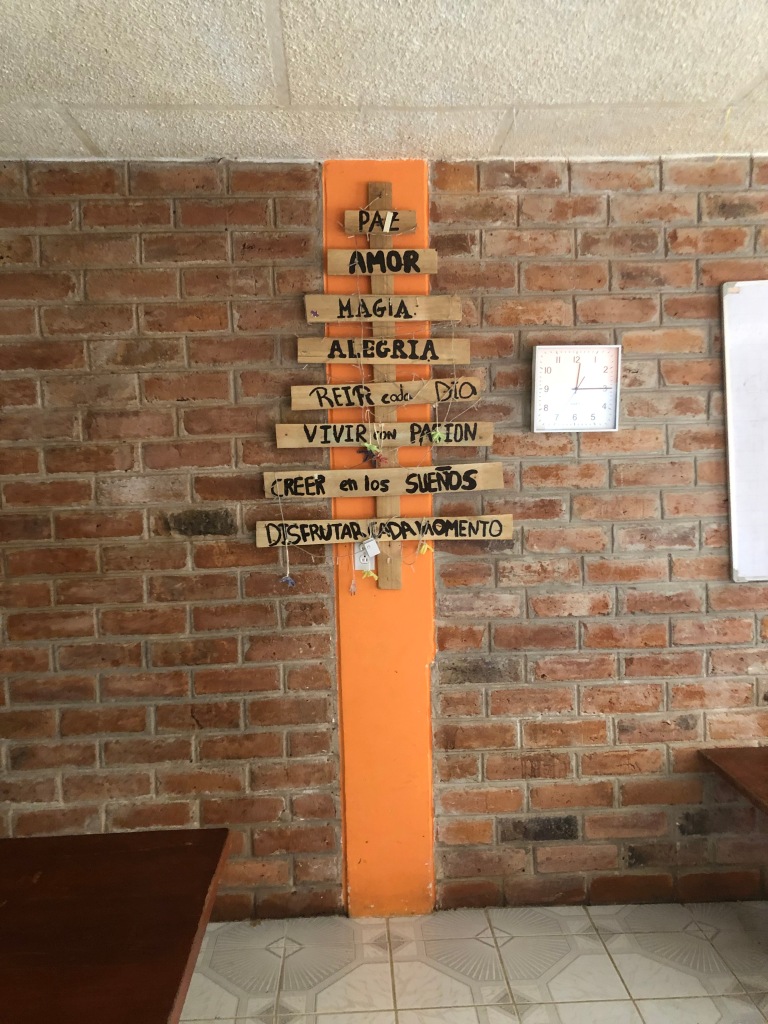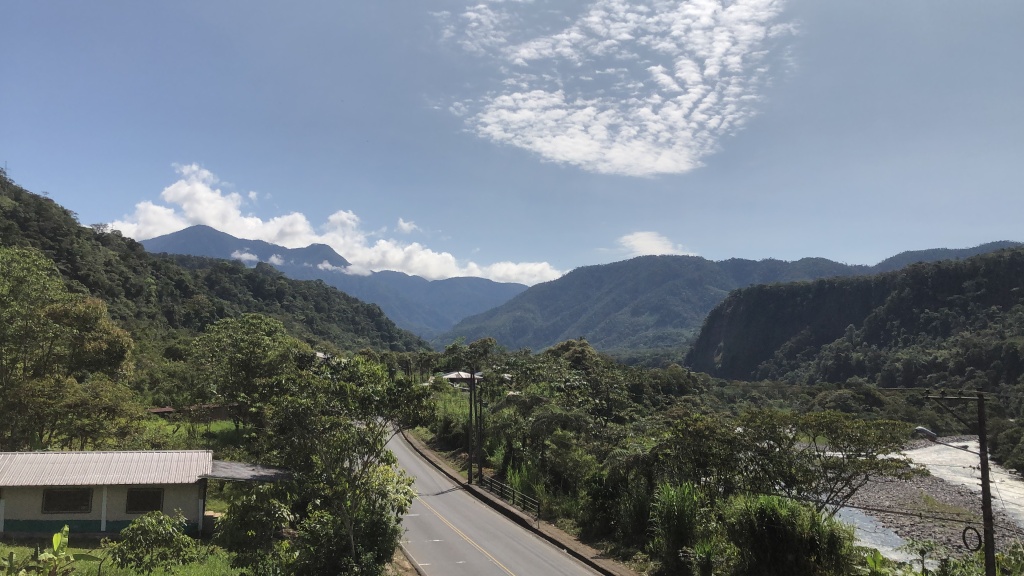in a misty valley, a river winds through hills draped in deep jungle. between the water and the foliage clings the pueblito of rio negro. a short drive west of the town center stands casa tao, a three story building with an interesting past. once a pizza joint, then a night club with a seedy reputation, it stood empty and decaying for years until it became, through much prayer and physical labor, a home for single teenage mothers from jungle communities trying to find a better life for themselves and their children. this drastic change in purpose was brought about by an amazing ecuadorian woman, ana. a young single mother herself once, she long had the vision of opening such a space to help others find their way. thirty or so young women have found their way here in the last few years, and beyond, to a new life.
casa tao (which stands for transición a la autonomía y orientación [transition toward autonomy and direction]) currently houses six young mothers or soon-to-be mothers, who each have a room to themselves and their young ones, as well as a therapist and a social worker, and, in a separate apartment, ana’s son jorge, who, with his hefty dog, is the night guard.
in an apartment on the second floor that will soon be used to house the therapist and social worker, ana and i sat and talked, about life, our histories, our ministries. i was happy to spend this time, productive less in a programmatic way than in a relational way, which is the basis of any ministry, i believe. or, as our friend henry from kiziba refugee camp says, ‘development has to start in friendship.’
i had met ana previously, in november, when bossman jim and i took a tour of various partner ministries, introducing me as the new connection between them and el refugio. i was retracing parts of that earlier trip, visiting the dynamic ministry in cajabamba with pastor manuel and his son marco (more on them another time), and then casa tao. though my spanish is still far from perfect, it was tested on this trip and, in ways, proved. and so ana and i talked.
in our conversation, throughout which i asked a barrage of questions, ana shared her concerns about the future of casa tao. specifically, the government was, fairly reasonably, demanding that certain codes and structures be met in order for there to be home for teenagers. adding the therapist and social workers to the staff, for example, were necessary steps. and a bunch of improvements to the building. which were slow in coming. an american, john, did all the handy work, but could have used some help wrapping things up before government inspectors were to show up in late march. this meeting was in late february.
in my mind, in planning and thinking about how to teach our el refugio interns (at the time, six, from three countries), i had a tentative plan of bringing them all down to casa tao to learn about and from ana and the ministry. thus in ana’s list of worries my brain made a connection. i asked her if bringing interns would be feasible, to learn and to work, for a few days, to finish the construction projects, to make sure that the government requirements were met on time, so that casa tao could continue. of course she said yes, bring them as soon as possible.
thus, meetings were held, logistics were planned, and two weeks later we took the interns to rio negro for four days of work, in which the needed projects and more were completed, and much friendly time was spent with the girls and their children
but i was not there most of that time. i drove down earlier in my own car with two of the longer-term interns. elliot and bethany, so they could join me at a meeting with the leader of another partner ministry, hang out with ana, and prepare a place for the rest. the other four interns and their leader luis would join us that night. the next day, around lunch, i drove back to el refugio with elliot so he could continue leading a group of volunteers there.
but before our departure, after a breakfast of eggs, pancito, and yucca graciously prepared by the girls, we from el refugio gathered in that second story apartment to hear ana’s story and all about the ministry. ana speaks no english, so i began translating for the north american interns who, though knowing at least some spanish, needed a little help understanding the story. soon john came in and took over; having lived in guatemala for three years, he was a little faster on his translating toes than i. but, after a while, as ana described the hardships of the ministry, she teared up, saying that they struggle a lot sometimes, but all their sacrifices were for the good of those girls. there was a pause. i wondered why john wasn’t translating that last bit when i looked up to see tears in his eyes as well, and, trying to get the words past his emotions, he couldn’t speak. so i translated. ana and john are very different people with very different styles of working, and knowing that they butt heads sometimes, it was incredible to see them so captured and moved by the same thought. for all their differences, they have a similar heart for the ministry.
afterwards, when the tears were wiped away, the work began. john described the projects and the interns jumped right in. i watched them grab tools and begin at john’s direction and i knew they were going to have a great week. after the projects were underway, i realized i was no longer needed. i had made the connections i had hoped to make and could step out. elliot and i said our goodbyes and departed.
a couple weeks later, in the community development class i hold with the four english-speaking interns, we discussed this trip. we were talking about how not to have a god complex when doing development/ministry work, how, in their specific context (and mine), not to be a ‘white savior’. the work trip to rio negro was the most typical mission trip kind of thing they’d done all the internship long, and we had some hesitation that it was the exactly right thing to do, given assessments of such work in books like when helping hurts and toxic charity, and another book i had been referencing much in class, cross-cultural servanthood. i recommend reading all of those, by the way. could we have done the work, completed the projects in a different way? probably. in community development theory, they say that the best work is done when different groups can collaborate to fill the gaps in another’s work, that a community developer will see these gaps across a range of circumstances and settings and make the connections. i see this trip as such a situation. their gap was timely work getting done, my gap was hands-on ministry and work experience for the interns. neither of us had money to spare. justifications aside, the trip happened, tasks were accomplished, things were learned.
i understand that a good community developer will ‘act, reflect, and refine their approach to do better.’* i am trying to do this. to such an end, in planning further trips, i am including the interns in the process, communicating closely with ministry leaders, to tailor the trips to specific needs/desires/assets, and what our interns can both learn and bring to the table. and we will examine and refine, for the next time. the process continues. and as we work, we pray our work does no harm.
*navigating community development by r.o. zdenek and d. walsh






Rob, I know you wrote this many moons ago, but it is refreshing to read your words. It always gives my soul hope to hear good things being done by others out there in the world. Makes me want to talk face to face again soon.
Hope all is well, Peter
On Mon, Apr 26, 2021 at 12:32 PM and everywhere i go i see You.. wrote:
> thesefrailhands posted: ” in a misty valley, a river winds through hills > draped in deep jungle. between the water and the foliage clings the > pueblito of rio negro. a short drive west of the town center stands casa > tao, a three story building with an interesting past. once a pizza” >